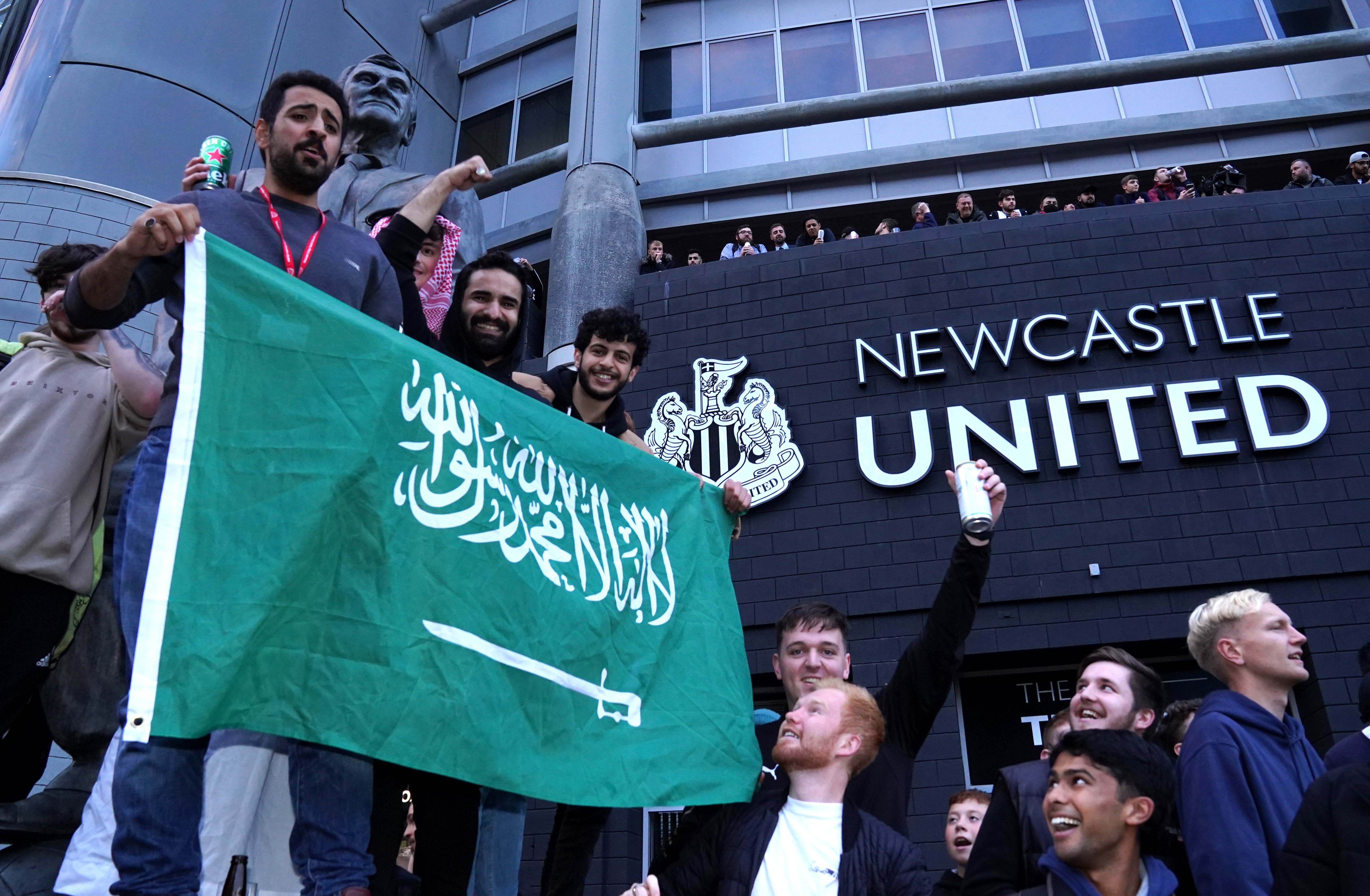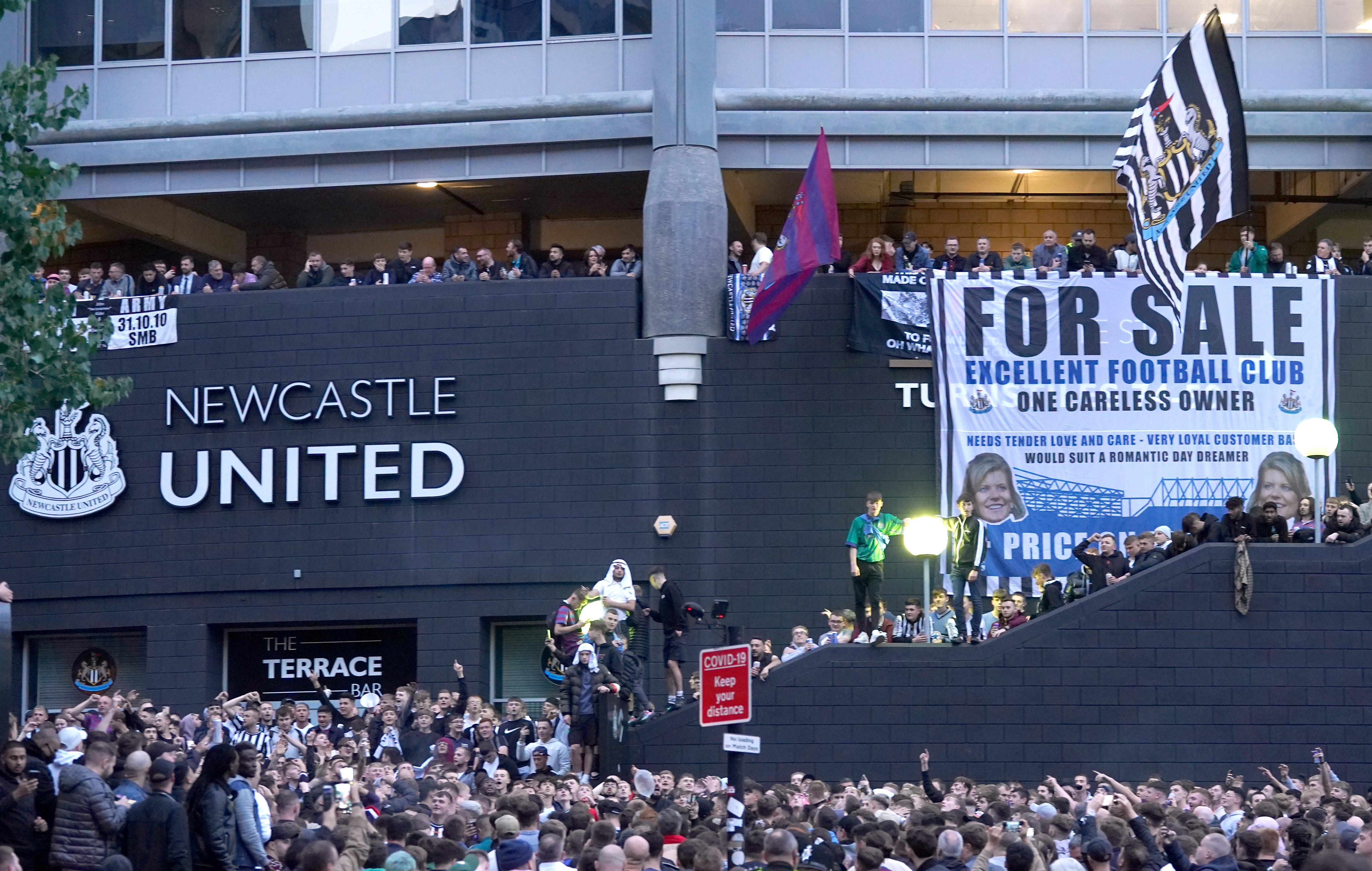Newcastle takeover: Why did the Premier League allow the Saudi-backed buyout to go through?
The league maintains it has had ‘legally binding assurances’ that the club’s new ownership is separate from Saudi Arabia but many experts query how that can be the case

Your support helps us to tell the story
From reproductive rights to climate change to Big Tech, The Independent is on the ground when the story is developing. Whether it's investigating the financials of Elon Musk's pro-Trump PAC or producing our latest documentary, 'The A Word', which shines a light on the American women fighting for reproductive rights, we know how important it is to parse out the facts from the messaging.
At such a critical moment in US history, we need reporters on the ground. Your donation allows us to keep sending journalists to speak to both sides of the story.
The Independent is trusted by Americans across the entire political spectrum. And unlike many other quality news outlets, we choose not to lock Americans out of our reporting and analysis with paywalls. We believe quality journalism should be available to everyone, paid for by those who can afford it.
Your support makes all the difference.As long as six months ago, the Premier League was given expert counsel that it would be virtually impossible to get any independent legal advice from within the Kingdom of Saudi Arabia [KSA] on whether the Public Investment Fund [PIF] is in any way separate from the state. It is why some of those whose analysis was requested have responded with utter bafflement, and some anger, that Thursday’s statement cited “legally binding assurances” that the absolute monarchy “will not control Newcastle United Football Club”.
One example comes from human rights charity FairSquare in May of this year, and a letter written by director James Lynch, who previously worked as a British diplomat in the Middle East.
“In my view the Premier League will find it extremely difficult to obtain an independent legal expert in Saudi Arabia in any case that is perceived as a challenge to or in conflict with the interests of Saudi Arabia’s Mohamed bin Salman [MBS],” the letter reads. “Any lawyer appearing on behalf of a party in a case in which the Crown Prince’s interests were challenged would in all likelihood face consequences.”
The letter goes on to outline the climate of repression in Saudi Arabia. One other report the Premier League received stated that the KSA was the ultimate beneficiary of PIF.
The crucial remaining question from the takeover of Newcastle is how it went from that knowledge to a situation where the move is sanctioned, despite any expert on the country insisting that the club is now in the hands of one of the most criticised states in the world.
What has changed? How was there such a transformation in the space of 24 hours?
Several sources with knowledge of the situation say it did not change in the space of a day. They maintain this comes after months of negotiation, and a thawing in the relationship between Qatar and Saudi Arabia following the easing of the Gulf blockade.
That alone says much about the state of the modern game.
The insistence is that Wednesday’s breakthrough on Qatar’s beIN Sport being shown in KSA is a consequence of this, rather than the spark for a sudden change in the takeover. The broadcasting announcement did catch some in the Premier League by surprise.
Some high-placed sources are asking why the competition tried to sue the Saudi state if the turnaround was not about piracy. They are complaining about an attempt to shift the narrative.
The Premier Leagues maintain it came down to paperwork.
In the initial attempts to take over Newcastle, “Form Four” of the owners’ and directors’ test was remarkably never filled in.
Some sources acerbically state that this is because it would have been signed on behalf of the state, which would have brought questions on the killing of journalist Jamal Khashoggi and a host of other human rights abuses.
“Maybe MBS would have been the first to fail the test,” one figure quipped.
The absence of entries on this form ultimately meant the Premier League had no actual decision to make for so long. “Fundamental to the case was control,” a figure with knowledge of the proceedings says.

In that time, the Premier League offered arbitration to resolve the issue, which was declined. The consortium temporarily walked away.
Those in the Premier League talk about “one of the most complicated takeovers” in the competition’s history. It was hugely slowed down by the legal process, and the attempts to understand Saudi law. It is maintained that any letters or reports were part of considerable due diligence.
All of that changed when PIF filled in Form Four in the last few months. This is why the line about “legally binding assurances” is so important, and so central to this.
The belief is that this means that PIF is a separate entity to KSA, that there will be no interference. The Premier League is “comfortable” with the way the structures have been presented.
It is also why many experts are so astonished. They would say the only thing that needs to be understood about Saudi law is that it is an absolute monarchy and what MBS says goes.
“If they had spoken to one single Saudi expert they would have been told PIF is KSA and legal assurances are meaningless,” Nick McGeehan, of FairSquare, tells The Independent.
There is even the argument that PIF is the most important apparatus of the modern Saudi Arabia because of how it has been entrusted with MBS’s mega-projects. It is at the very centre of its future plans, which involve diversification of revenue, and – by extension – “sportswashing”.
It makes assurances even harder to take at face value, since MBS doesn’t even need to say much. His very power conditions everything. The structure of the state means bodies will often act in a manner that they believe follows his wishes.
That puts considerable doubt on the idea that the Premier League would be able to discern state influence and potentially punish Newcastle United’s owners for breaches. In such a case, directors could be disqualified.
That obviously brings the question of why the measures have been so laissez-faire, why some of this was not preempted? Why weren’t clubs protected from purchase by sovereign wealth funds or states?
The Premier League maintains that the owners’ and directors’ test is constantly reviewed, with the financial implosion of Portsmouth the last major example that brought considerable changes. One argument now is that rules can’t be changed in the middle of a takeover.
Human rights groups such as Amnesty would insist they have long warned football’s authorities of this. A problem now is that the horse hasn’t so much bolted, as actually finished the race.
There are not that many states looking to buy football clubs. For a long time, Saudi Arabia was seen as the one remaining power seeking to “sportswash” but without a club. They now have one of England’s biggest names.
One source with knowledge of the plans says it will not be expenditure levels of Chelsea 2003 or Manchester City 2009, but more “prudent” investment. The intention is still to make Newcastle the centre of a globalised project for Saudi Arabia.
Some with knowledge of the area believe the kingdom is much more haphazard in such pursuits than, say, Abu Dhabi. That remains to be seen.
For now, it all leaves more profound questions.
Is the Premier League concerned about its international image being damaged by one of the world’s most criticised states owning one of its members? How does this reflect on the Premier League’s campaigns around inclusivity – such as rainbow laces – given the state’s appalling record on women and homosexual rights to go with a multitude of other human rights abuses?
The competition would repeat the same response to all these questions: that it has “legally binding assurances” that the Public Investment Fund is separate to the Kingdom of Saudi Arabia.
Experts in the field would say that’s a fantasy, given it is the state’s sovereign investment fund. That, mere months after the Super League, is where the modern game is.
Jubilant Newcastle fans are celebrating the takeover, despite so many questions about human rights. Critics of KSA would say that football suffering is simply irrelevant next to the real-world suffering so many victims of the state have faced.
But this is a world where a state’s sovereign wealth fund is supposedly separate from the state.



Join our commenting forum
Join thought-provoking conversations, follow other Independent readers and see their replies
Comments